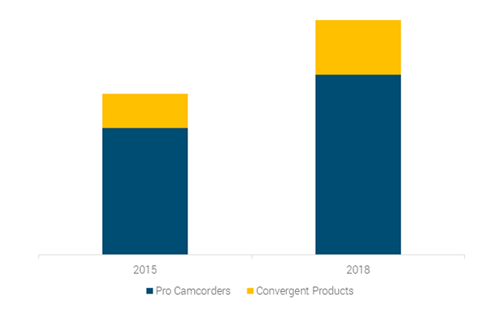DSLRs and Mirrorless Camera Products Accounted for 56% of the UK Pro Video Camera Market in 2018
Camera Market Analysis and Commentary
Professional video acquisition is continuing to evolve, as DSLRs and mirrorless cameras are poised to dominate the market. In volume terms, these ‘convergent’ products accounted for 56% of the pro video camera UK market (including pro camcorders, but excluding high end digital cinema cameras) in 2018, according to a new industry report from Futuresource Consulting.
“Use of convergent products, such as DSLRs and mirrorless cameras, is severely limiting the professional camcorder market. These products are already dominating the lower end of the professional acquisition market and this will only continue,” says Ruben Baveld, Research Analyst. “We’re now seeing the majority of videographers shunning pro camcorders and opting for a mirrorless camera or DSLR instead.”
This is not a new trend; after the hype around the first wave of video DSLRs died down, some end users moved back to pro camcorders due to frustrations with the convergent products’ lack of video functionality. The second and third waves of convergent products remedied this deficiency and the segment is experiencing significant uptake once again, particularly with the new generation of video makers.
“Video is moving front and centre, playing a dominant role in our societies and cultures,” says Baveld. “A wide range of organisations are now looking to professional grade video to demonstrate the value of their offerings. Everyone from large corporates and educational establishments, to gyms, bars and sports clubs. It’s the power of social media channels. Anyone can distribute video and be heard, and that’s one of the main drivers behind all this activity.”
The perception of convergent products’ high video quality to price ratio makes them extremely attractive to these new video professionals. These users may not be familiar with pro camcorders or traditional pro video equipment channels, but they are accustomed to stills cameras and where they can be bought.
Not only are parts of the pro video acquisition market transitioning over to convergent products, but in the convergent market itself DSLRs are increasingly losing out to mirrorless cameras. In the UK, mirrorless cameras shipped into pro video applications outsold DSLRs by a factor of almost nine to one.
“Most innovation is taking place in the mirrorless camera category,” says Baveld, “with smaller form factors, increasing use of full frame sensors and lower prices all putting pressure on DSLRs. However, at the same time, we’re seeing high-quality smartphones starting to eat their way into the lower end of the mirrorless camera market. This, combined with market saturation, means that sales of convergent products will peak this year before gradually declining over the coming years.”
UK Pro Video Installed Base Development - Convergent Devices & Pro Camcorders

Latest Professional Broadcast Insights
